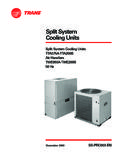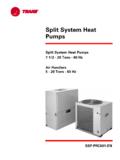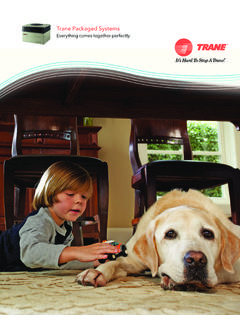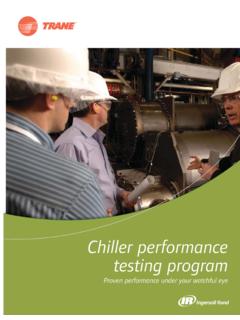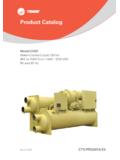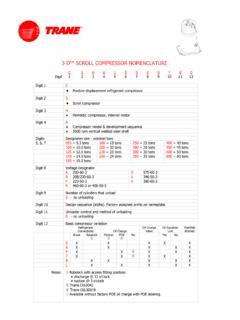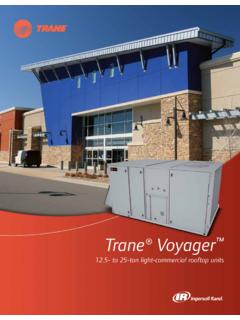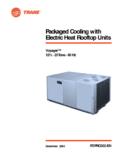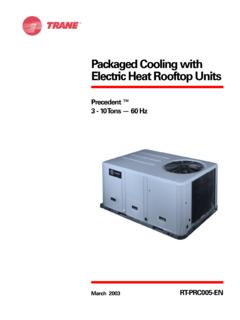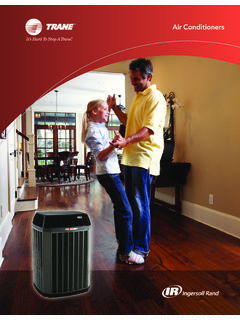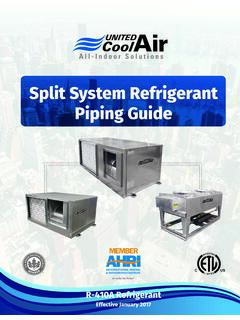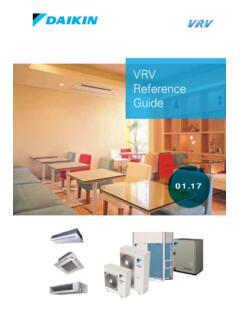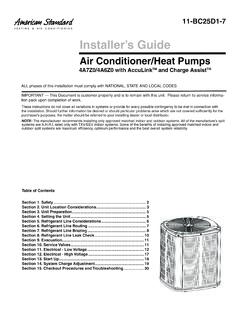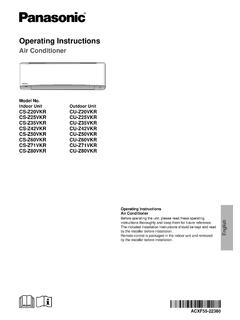Transcription of Tube Size and Component Selection - Trane
1 Tube size and Component Selectionfor Systems Comprised of BCHC and BCVC Blower Coils, Paired With R-410A Condensing Units and Heat Pump UnitsApplication GuideMay 2020SS-APG010C-ENSAFETY WARNINGOnly qualified personnel should install and service the equipment. The installation, starting up, and servicing of heating, ventilating, and air-conditioning equipment can be hazardous and requires specific knowledge and training. Improperly installed, adjusted or altered equipment by an unqualified person could result in death or serious injury. When working on the equipment, observe all precautions in the literature and on the tags, stickers, and labels that are attached to the 2020 Trane . All Rights , Cautions and NoticesWarnings, Cautions and that warnings, cautions and notices appear at appropriate intervals throughout this manual.
2 Warnings are provided to alert installing contractors to potential hazards that could result in personal injury or death. Cautions are designed to alert personnel to hazardous situations that could result in personal injury, while notices indicate a situation that could result in equipment or property-damage-only personal safety and the proper operation of this machine depend upon the strict observance of these Concerns!Scientific research has shown that certain man-made chemicals can affect the earth's naturally occurring stratospheric ozone layer when released to the atmosphere. In particular, several of the identified chemicals that may affect the ozone layer are refrigerants that contain Chlorine, Fluorine and Carbon (CFCs) and those containing Hydrogen, Chlorine, Fluorine and Carbon (HCFCs). Not all refrigerants containing these compounds have the same potential impact to the environment.
3 Trane advocates the responsible handling of all refrigerants-including industry replacements for CFCs such as HCFCs and refrigerant Practices! Trane believes that responsible refrigerant practices are important to the environment, our customers, and the air conditioning industry. All technicians who handle refrigerants must be certified. The Federal Clean Air Act (Section 608) sets forth the requirements for handling, reclaiming, recovering and recycling of certain refrigerants and the equipment that is used in these service procedures. In addition, some states or municipalities may have additional requirements that must also be adhered to for responsible management of refrigerants. Know the applicable laws and follow Personal Protective Equipment (PPE) Required!Installing/servicing this unit could result in exposure to electrical, mechanical and chemical hazards.
4 Before installing/servicing this unit, technicians MUST put on all Personal Protective Equipment (PPE) recommended for the work being undertaken. ALWAYS refer to appropriate MSDS sheets and OSHA guidelines for proper PPE. When working with or around hazardous chemicals, ALWAYS refer to the appropriate MSDS sheets and OSHA guidelines for information on allowable personal exposure levels, proper respiratory protection and handling recommendations. ATTENTION: Warnings, Cautions and Notices appear at appropriate sections throughout this literature. Read these : Indicates a potentially hazardous situation which, if not avoided, could result in death or serious : Indicates a potentially hazardous situation which, if not avoided, could result in minor or moderate injury. It could also be used to alert against unsafe : Indicates a situation that could result in equipment or property-damage-only SS-APG010C-ENWarnings, Cautions and Notices If there is a risk of arc or flash, technicians MUST put on all necessary Personal Protective Equipment (PPE) in accordance with NFPA70E for arc/flash protection PRIOR to servicing the to follow recommendations could result in death or serious refrigerant under Higher Pressure than R-22!
5 The unit described in this manual uses R-410A refrigerant which operates at higher pressures than R-22 refrigerant . Use ONLY R-410A rated service equipment or components with this unit. For specific handling concerns with R-410A, please contact your local Trane representative. Failure to use R-410A rated service equipment or components could result in equipment or components exploding under R-410A high pressures which could result in death, serious injury, or equipment damage. 2020 Trane . All Rights Reserved SS-APG010C-ENIntroductionThis application guide provides refrigerant piping guidelines for Trane split system outdoor unit models ranging in capacity from to 10 tons when matched to Trane indoor models BCHC and BCVC 024 through 090. Use the information presented here to properly select interconnecting piping and refrigerant components for these systems.
6 These systems are designed and intended for the use of R-410A and POE oil. All components of the system must also be designed and intended for R-410A and POE publication also outlines an envelope of application that is based on the proximity of the refrigerant components. The guidelines presented pertain specifically to the operating envelope for standard air-conditioning applications that deliver either a constant or variable volume of airflow and that provide no more than 45 percent ventilation (outdoor) air. Prospective applications outside this operating envelope including low-ambient, process, and 100-percent outdoor-air applications must be reviewed by Trane to help ensure proper performance. WARNINGR-410A refrigerant under Higher Pressure than R-22!The unit described in this manual uses R-410A refrigerant which operates at higher pressures than R-22 refrigerant .
7 Use ONLY R-410A rated service equipment or components with this unit. For specific handling concerns with R-410A, please contact your local Trane representative. Failure to use R-410A rated service equipment or components could result in equipment or components exploding under R-410A high pressures which could result in death, serious injury, or equipment and the Trane logo are trademarks of Trane in the United States and other countries. All trademarks referenced in this document are the trademarks of their respective owners. iv SS-APG010C-ENTable of ContentsIntroduction .. iiiOverview .. 1 Resources .. 1 Background .. 1 Updated Guidelines .. 2 Liquid Lines .. 2 Suction Lines .. 3 Equipment Placement .. 3 Line Sizing, Routing, and Component Selection .. 5 Liquid Lines .. 5 Line Sizing .. 5 Routing.
8 6 Insulation .. 6 Components .. 6 Gas Line .. 7 Line Sizing .. 7 Routing .. 7 Insulation .. 8 Components .. 8 Access Port .. 8 Expansion Valves .. 9 Controls .. 10 Hot Gas Bypass .. 11 refrigerant piping Examples .. 12 Heat Pump and Blower Coil Matches .. 15 Parts .. 16SS-APG010C-EN1 OverviewThis guide should be used only for new systems design. It is not to aid with the remodel, retrofit, or partial replacement of older systems. Older blower coils and heat pump systems were not designed for the higher pressures of s 4 TTA3, 4 TWA3, 4 TTB3 and 4 TWB3 sizes 1-1/2 through 5 ton and TTA073D and TWA120D sizes 5 through 10 ton cooling only and heat pump products have been matched to Trane indoor unit models BCHC and BCVC 024 through 090. Beginning mid-2009, the TTA and TWA 6- through 20-ton product line has been designed for use only with R-410A and POE oil (check unit modelnumber for specific refrigerant ).
9 R-410A is a high-pressure refrigerant that requires the othercomponents of the system to be rated for R-410A. For compressor lubrication, the refrigerantrequires POE s BCHC and BCVC 024-090 blower coil air handler products have also been redesigned for use with the higher pressures of , refrigerant piping practices were guided by four principles: Return the oil to the compressor. Maintain a column of liquid at the expansion valve. Minimize the loss of capacity. Minimize the refrigerant charge in the piping practices are similar for R-410A and POE oil. However, because of the different mass flows and pressures, the line diameter required to carry the oil and refrigerant may not be the same as a similar tonnage R-22 unit. Also, the allowable pressure drop may be greater for R-410A than accumulated over years of observation demonstrates that the lower the refrigerant charge, the more reliably a split air-conditioning system performs.
10 Any amount of refrigerant in excess of the minimum design charge becomes difficult to manage. The excess refrigerant tends to collect in areas that can interfere with proper operation and eventually shortens the service life of the successfully minimize the system refrigerant charge, the correct line size should be used and the line length must be kept to a purpose of this Application guide is to aid the designer in applying the 4 TWA, 4 TTA, TTA, and TWA R-410A products with either BCHC or BCVC blower coils. For more information about the outdoor units, refer to the following application guides: refrigerant piping Systems [32-3009-03; SS-APG006-EN] Tube size and Component Selection for TTA and TWA split Systems (6-20 Tons) UsingRefrigerant 410A [SS-APG008-EN]BackgroundIn a split air-conditioning system , the four major components of the refrigeration system are connected by field-assembled refrigerant piping (Figure 1).
